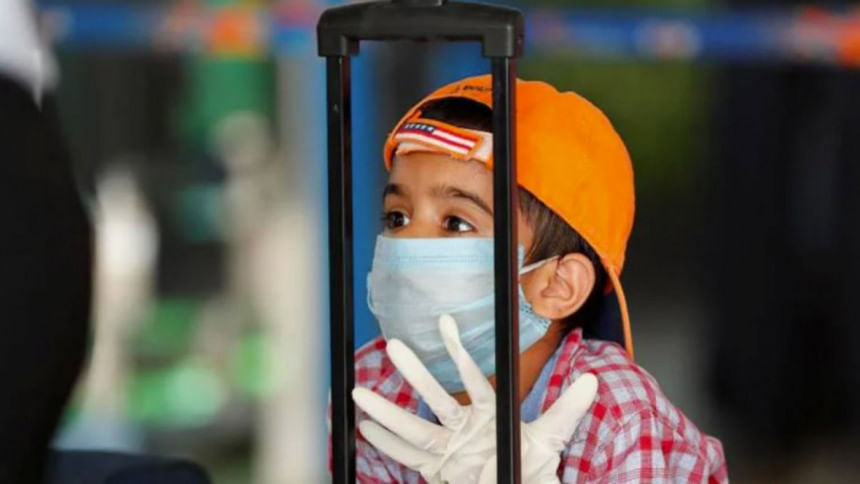Protecting children’s mental health during Covid-19

Recently, many parents in Bangladesh are expressing concerns about the behavioural changes of their children and feeling worried about the impacts of Covid-19 related restrictions on their health and wellbeing.
During an interview, Nancy Close, Assistant Professor at the Child Study Center at the Yale School of Medicine and Associate Director of the Yale Program in Early Childhood Education, explained what parents may be experiencing with their children (from toddlers to university students):"I've been seeing a lot of regression and more than what, in typical times, is developmentally appropriate. I've seen children regressing through using baby talk, needing help with routines, needing help with sleeping and toileting—and much more than what's usual for them. Coping with and expressing strong feelings can be really challenging, so we're seeing temper tantrums in older and younger children and even college students. We are discovering that consistency and predictability have been more difficult to achieve during Covid-19. This can lead children to feel anxious and frustrated which can certainly result in behavioural dysregulation."
Covid-19 is primarily a public health emergency, but it has lots of secondary impacts on children's education, health and protection, in the short and long run. Due to prolonged school closure and social isolation, children have lost their regular lives.
Covid-19 has created stress for parents all over the world. Many of them are struggling to manage working from home and looking after children. In our society, we hear about this in general discussion and media also highlights the challenge. However, are we realising that children are used to going to schools, interacting with friends and being taught by teachers? Staying at home is stressful for them also. Are we viewing things from children's points of view? Are we listening to their concerns meaningfully?
"Impact of Covid-19 pandemic on the mental health of children in Bangladesh: A cross-sectional study", published by Children and Youth Services in October, 2020, highlighted that children are suffering from depression, anxiety and sleeping disorders. Estimates of moderate and severe mental disturbance were 19.3 percent and 7.2 percent respectively.
Different children are reacting differently to the situation. Many children have been resilient and adjusted to the crisis. However, there are many who need support to go through this difficult time. It is important that parents, caregivers, teachers and other adults of society have the sensitivity and capacity to respond to their needs.
Research on effective parenting in the last 30 years demonstrated that parents need to provide warmth as well as structure, according to the age of their children. Parents should understand how children think and feel at various stages. Effective parent-child communication is critical at any and all times, and particularly during the Covid-19 crisis. Positive parenting messages, as well as messages on how all members of society can be more child-sensitive, should be promoted through print, electronic and social media.
Children need to feel they are being loved by parents and caregivers. It is also helpful when family members spend quality time together. Children should be encouraged to play, read books, maintain an active life by engaging in various activities, and reduce over-reliance on electronic devices. Parents should also limit their own screen time, as children follow what adults do.
Children have a lot of questions, especially during crisis periods. Parents can share age-specific information with their children on how the virus spreads, what they can do to protect themselves, and the efforts that are being taken throughout the world to fight the pandemic. Parents can take initiatives to limit children's consumption of news to avoid unnecessary worries. The pandemic also provides an opportunity to teach children the importance of receiving information from credible sources.
There is no need for parents and caregivers to ask too many questions on how children are feeling. But children should feel reassured that there is someone they can talk to if they want. Some may like to draw. Some may want to talk. They should be encouraged to express themselves in ways they are comfortable with.
Children get their emotional cues from adults. So, parents should not express anxieties in front of children. Parents need to find support around managing their own stress as this can ultimately help their children's wellbeing.
If a child continues to show signs of distress that affects his/her daily functioning and/or are not regular (e.g. sleeplessness, lack of concentration, acting in a way that is suitable for children younger than his/her age), then parents should seek support from a trained mental health expert. As a society, we should also learn to understand that mental health is very important for our overall wellbeing, and there should not be any stigma about this.
The capacity of teachers should be developed so that they are able to respond to the needs of children when they return to school. They should be trained on mental health concerns that children are likely to face, what signs of distress may look like, and how to intervene with appropriate action and referral. Schools should also support teachers to manage their own stress.
The executive director of UNICEF has cautioned that if children's wellbeing is not adequately addressed, "The mental health consequences for a generation of children and young people could far surpass the immediate health and economic impact of the Covid-19 pandemic, leaving long-term social and economic consequences in its wake."
Children's health, nutrition, education, protection and overall wellbeing will be profoundly influenced by the impacts of the global pandemic. The next decade could see a huge reversal in children's rights or be a significant moment in the fight for a world where all children can grow up to realise their potential. It will depend on the decisions we make today. If we are serious in addressing the negative consequences of Covid-19 on children's lives, which includes stopping developmental regression, and protecting their mental health, then policymakers must make investing in children a priority.
Laila Khondkar is an international development worker.

 For all latest news, follow The Daily Star's Google News channel.
For all latest news, follow The Daily Star's Google News channel. 



Comments